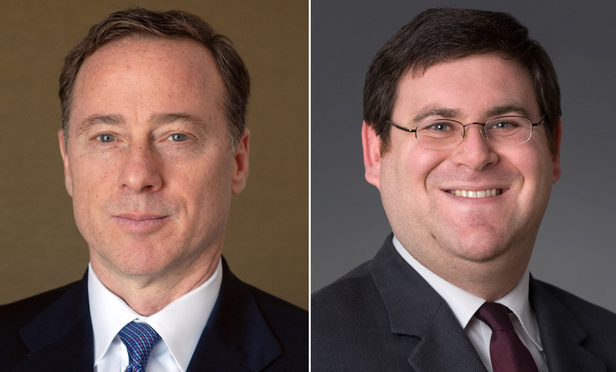Steven M Witzel

January 06, 2016 | New York Law Journal
Mini-En Banc Review in the Second CircuitIn their Corporate Crime column, Steven M. Witzel and Samuel P. Groner discuss the Second Circuit's use of the "mini-en banc" when it desires to overrule one of its precedents but there is no intervening Supreme Court decision that it can point to for justification.
By Steven M. Witzel and Samuel P. Groner
23 minute read

September 10, 2015 | New York Law Journal
Grand Jury Reform One Year After Ferguson and Staten IslandIn his Corporate Crime column, Steven M. Witzel of Fried, Frank, Harris, Shriver & Jacobson surveys the current status of state and federal efforts to reform the grand jury system, and seeks to provide an overview of the various reform efforts and where the consensus is heading.
By Steven M. Witzel
27 minute read

September 10, 2015 | New York Law Journal
Grand Jury Reform One Year After Ferguson and Staten IslandIn his Corporate Crime column, Steven M. Witzel of Fried, Frank, Harris, Shriver & Jacobson surveys the current status of state and federal efforts to reform the grand jury system, and seeks to provide an overview of the various reform efforts and where the consensus is heading.
By Steven M. Witzel
27 minute read

May 07, 2015 | New York Law Journal
Private Equity Firms Under Increasing Regulatory SpotlightIn his Corporate Crime column, Steven M. Witzel writes: While it remains to be seen whether the government's focus on private equity will result in significant FCPA-related and other enforcement activity, it is clear that transparency throughout the private equity industry is a priority.
By Steven M. Witzel
14 minute read

May 06, 2015 | New York Law Journal
Private Equity Firms Under Increasing Regulatory SpotlightIn his Corporate Crime column, Steven M. Witzel writes: While it remains to be seen whether the government's focus on private equity will result in significant FCPA-related and other enforcement activity, it is clear that transparency throughout the private equity industry is a priority.
By Steven M. Witzel
14 minute read

January 15, 2015 | New York Law Journal
Grand Jury Practice, Protests and ReformIn his Corporate Crime column, Steven M. Witzel explains the history and purposes of the grand jury, highlights the differences between federal and New York state practice, addresses the prosecutor-law enforcement conflict issue and reviews the legislation designed to ameliorate it.
By Steven M. Witzel
34 minute read

January 14, 2015 | New York Law Journal
Grand Jury Practice, Protests and ReformIn his Corporate Crime column, Steven M. Witzel explains the history and purposes of the grand jury, highlights the differences between federal and New York state practice, addresses the prosecutor-law enforcement conflict issue and reviews the legislation designed to ameliorate it.
By Steven M. Witzel
34 minute read

January 02, 2014 | New York Law Journal
Judicial and Crime Victim Scrutiny of Binding Plea AgreementsSteven M. Witzel, a partner of Fried, Frank, Harris, Shriver & Jacobson, writes: Binding plea agreements can serve as a means to provide some certainty in post-'Booker' sentencing. As such, the manner in which courts review such agreements and permit victims to voice their objections and have input will effect how prosecutors, defense counsel, and defendants approach plea bargaining.
By Steven M. Witzel
13 minute read
March 09, 2009 | National Law Journal
Cooperation, privilege and internal investigationsSignificant recent developments regarding cooperation with the government during internal investigations have affected the preservation of the attorney-client privilege and work-product protection.
By Steven M. Witzel and Brenda E. Cooke / Special to The National Law Journal
11 minute read
November 01, 2012 | New York Law Journal
Victim Recovery After Ponzi Scheme UnravelsIn his Corporate Crime column, Fried, Frank, Harris, Shriver & Jacobson partner Steven M. Witzel writes: Arguably every investor in a Ponzi scheme is a "loser" - duped and betrayed by someone who they trusted with their money. But in the wake of the Madoff and other Ponzi-style investment scandals, courts and commentators have struggled to differentiate between "winner" and "loser" investors in order to determine "fair" compensation for victims.
By Steven M. Witzel
11 minute read
Trending Stories
- 1Gibson Dunn Sued By Crypto Client After Lateral Hire Causes Conflict of Interest
- 2Trump's Solicitor General Expected to 'Flip' Prelogar's Positions at Supreme Court
- 3Pharmacy Lawyers See Promise in NY Regulator's Curbs on PBM Industry
- 4Outgoing USPTO Director Kathi Vidal: ‘We All Want the Country to Be in a Better Place’
- 5Supreme Court Will Review Constitutionality Of FCC's Universal Service Fund
More from ALM
- Legal Speak at General Counsel Conference East 2024: Match Group's Katie Dugan & Herrick's Carol Goodman 1 minute read
- Legal Speak at General Counsel Conference East 2024: Eric Wall, Executive VP, Syllo 1 minute read
- Legal Speak at General Counsel Conference East 2024: Virginia Griffith, Director of Business Development at OutsideGC 1 minute read



